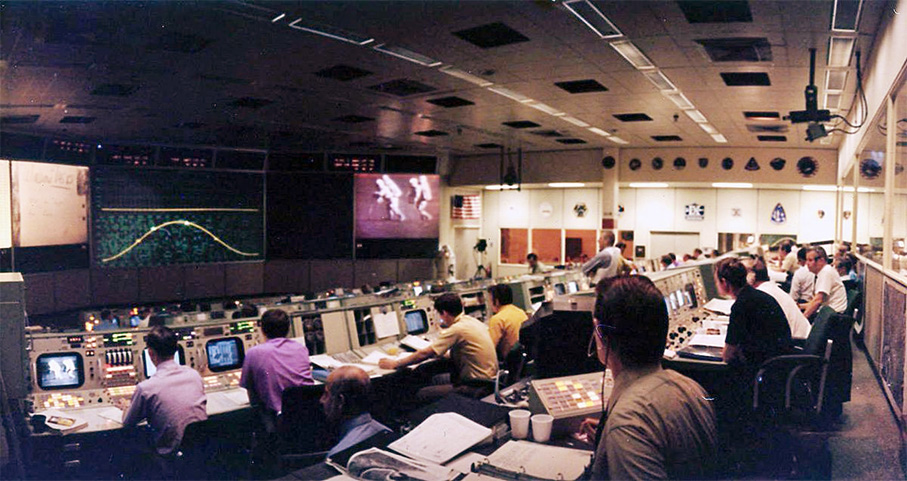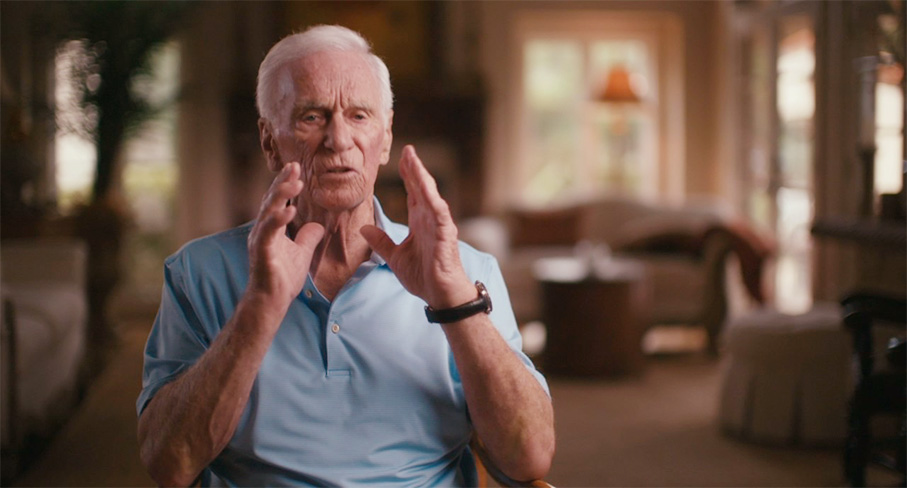| |
"From out there on the Moon, international politics look so petty. You want to grab a politician by the scruff of the neck and drag him a quarter of a million miles out and say, 'Look at that, you son of a bitch.'" |
| |
Edgar Mitchel, Apollo 14 astronaut, from People magazine, 8th April 1974 |
There are two lovely shocks at the start of this superb documentary, ones that I'll reveal at the close of the review, surprises which if nothing else, present NASA in an even more heavenly light from my own positively prejudiced point of view. This year first came Hidden Figures, the wonderful story of three African American female 'computers', human beings with jaw-dropping mathematical skills using their abilities to calculate rocket trajectories. On its heels comes Mission Control, David Fairhead's loving celebration of all things NASA and in particular, Mission Control and the men still alive to tell their stories. Before I go any further, I must single out certain individuals' contributions. I've not seen a documentary in ages with such a finely judged score. It's moving when it needs to be, serene when required and it deftly projects an unobtrusive but powerful emotional presence. Take a bow, composer Chris Roe. Director Fairhead's background is in editing and this film is, unsurprisingly, beautifully cut. As a fellow editor, our paths almost crossed. He cut a TV series called Extraterrestrial for Big Wave Productions and I cut The Making of Extraterrestrial for the same company. For my money, the nicest surprise on the man's CV is that he edited all the episodes from Chris Morris' groundbreaking series, The Day Today. Kudos. This next remark won't mean much to most of you but when the words "...old woman up a stick in a deserted field," were delivered in Morris' archly patronising 'newsreader' style, I almost passed out with laughter. You'll have to see the sequence. It's the final one in the first episode... The shepherd whistling his sheepdog to control a helicopter... There's a link at the end of this review.

In his capacity as director, Fairhead and Roe's spotting (the technical movie term for answering the question "Where should the music go?") is, ahem, absolutely spot on. When in command of original shooting, the director gets cinematographer Ian Salvage to use a slider, a rather lovely device that takes the camera at a leisurely pace from left to right and vice versa. It's a signature style throughout the film and for some reason it is mysteriously evocative and makes street signs, all named with NASA's signature, mythical nomenclature, almost ethereal. I cut a few films last year with a filmmaker very fond of said device. It works so well in almost every context in any genre. I also want to point out the film's brilliant use of oh-so subtle CG effects. Nods to Mark Craig and Penny Holton. Their work is simple (trust me, that's hard) but clean and pure. We know we're not watching NASA footage but their computer generated mock-ups of certain situations and events in the Apollo missions are done with such care that you are never asked to just admire the CG. It's wonderfully integrated into the documentary in that it feels absolutely natural and utterly at home.
Of course the sections that make up the bulk of Fairhead's film are; original interviews with all the surviving members of Mission Control during the Apollo era; snatched archive of astronauts; all those endlessly smoking worry pots pouring over their monitors in the trench-like, lines of desks; and of course, the rockets doing their thing. I was afraid I may have heard all the stories before as not only was I an avid consumer of the NASA news from the mid 60s, I worked on a film about the Gemini space programme so a lot of key events were not new to me. But there were a few revelations that made me reel in surprise but the great stories are those that are known and the retelling through the eyes of the men involved is even better than the memory I have of the incidents themselves. It's like hearing a cover version of a revered song and being so mesmerised by it that the cover then basks in even more reverence.
In what may be termed a 'meta-nod' in the film, astronaut Jim Lovell jokes (I'm assuming this isn't true...) about him deliberately delaying his first transmission after passing through the atmosphere on the ill-fated Apollo 13 mission. He says something like "It would be a great moment in a movie!" And so it was. I am still bowled over, whoever mentions it, by the fact that the average age of those at Mission Control was merely 30. During the actual first moon landing, it was 28. These things do not compute. Just how did these guys (and back room girls) pull off sending two men and then more to stand on another planet? And no, I will not be entertaining any conspiracy theorists that claim to be able to prove that we didn't land on the moon. We did. And we got back. I'm still in awe of these people - astronauts and those at Mission Control.

There is a blatant and dark acknowledgement of the role of NASA's first real tragedy in the Apollo programme. Simulating being in space, astronauts Grissom, Chaffee and White were in an all oxygen atmosphere, locked into their capsule. An errant spark lit the highly flammable gas and all three were killed in the resulting fire. Gene Kranz, perhaps the most famous mission controller (played by Ed Harris in the movie of Apollo 13), delivered a moving speech that sent the company forward with more purpose and more accountability. In the documentary, the older Kranz says to his team "It was almost murder and that you are all responsible for killing the crew..." These are harsh words however true. But NASA changed that day. Kranz says "Had the fire not happened, we wouldn't have gone to the moon..." Big statement. But they did go and go again. There's a very interesting parallel to the moon landing in, of all things, a well-loved British sit-com called Yes, Minister in an episode called Big Brother. Politician Jim Hacker is trying to outwit his civil service mandarin, Sir Humphrey Appleby. Being told over and over that what he wants to do is impossible, Hacker simply announces in a TV interview that it will be done so Appleby is effectively checkmated. In the days when American Presidents were inspiring and not making you weep with mute disbelief, President Kennedy made a very significant speech... "We choose to go to the Moon in this decade and do the other things, not because they are easy, but because they are hard..." He was doing the same thing as Jim Hacker, committing his country to achieving something simply because he had publically announced it. To this day I think the moon landing is the most inspiring thing the human race has ever achieved. And we subsequently failed to capitalise on it but I suppose that has more to do with our extraordinary and detrimental relationship with money and earthbound strife and simple disinterest more than human ambition.
No matter. This beautifully made film has one stand out scene, a reenactment of Jim Lovell's second most famous time in space and to my enormous surprise I got extremely emotional and acted just like the interviewees said they had reacted when it had actually happened on Christmas Eve, 1968. As Anders, Lovell and Borman came out from orbiting the dark side of the moon, seeing the famous 'Earthrise' for the first time, the three astronauts delivered a message to the world. I knew about this event before but the presentation of the moment in the documentary was so well done, I got swept up in the fresh telling. The crew, in turn, read a passage from the Bible, Genesis of course, verses 1 to 10. Despite my being divested of faith at a very early age, this literature still has tremendous resonance even with atheists brought up in the Christian tradition. As Dr. Jonathan Miller once said in a terrific BBC 4 series on disbelief, his life would have been considerably poorer without knowledge of the myths of religion. "And the earth was without form, and void; and darkness was upon the face of the deep." Powerful stuff.
The two shocks I mentioned at the start of the review (yes, this is the pay off paragraph) are very simple to convey. What comes to mind when I say NASA Flight Controller? Seriously, who do you picture in that role? I'm out on a limb here but I'm pretty sure you have a man in mind with a narrow headset and (in Apollo 13's case) he's wearing a 'vest'. In the UK, we call that a waistcoat. The wonderful surprise is that the two contemporary flight controllers featured at the very start of the film were both (drum roll) women! Take a bow Ginger Kerrick and Courtney McMillan. God, I love NASA. If you have any interest in mankind's ambition to reach the stars, then this is a film for you. As the movie The Right Stuff proudly proclaimed on its poster, 'How The Future Began' and how right it was... Highly recommended.
MISSION CONTROL will have preview screenings and is available On Demand & DVD from 14th April.
For The Day Today sequence: https://www.youtube.com/watch?v=eTGE9153VFE |